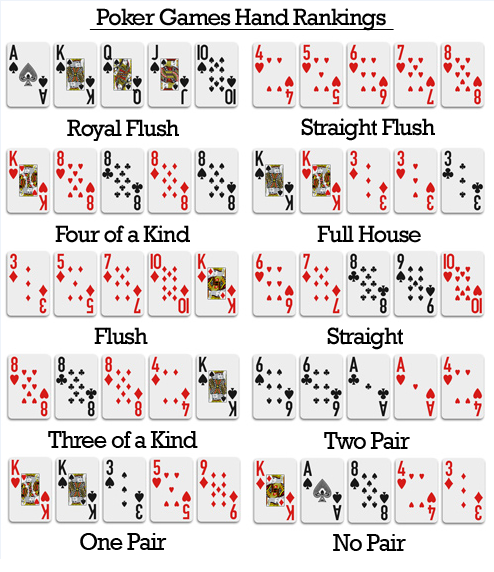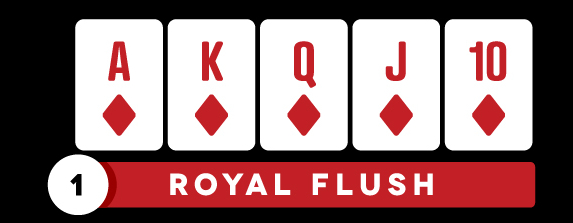In tournament poker, casino poker, or any online game I’m aware of, the pot is split between hands of equal value, just like in all other cases of a tie. In five-card draw poker, it is not possible to tie on three of a kind, a full house, or four. Who wins when two players have a flush? For example, say the first player also has two pair, one in their hand (two 3's), and one on the board (two 8's). The second player has AQ. Two players are all in pre-flop, hands on their backs. As you might have guess, both hands are basically even odds to win - ie 50/50, or that of a coin flip. The most common 'flip' situation you'll see (or more likely be in) is the classic pair vs. Eg AK vs 99 or AJ vs 77.
If you are interested to get the best rakeback deals and private promotions on poker sites head on to PokerPro website (PS: there are plenty of options to choose from also for the USA players).
A full house is a very powerful hand. It beats all the straights and also all the flushes. You can expect to print money whenever you have a full house at showdown. But here and there, it will happen that not only will you have one at showdown, but also your opponent. At first, I know it can be confusing who wins, but after reading this article, you will know exactly which way the chips are going.

Who wins if two players have a full house? The person with the highest full house wins if both players have a full house. If a full house is of the same rank for both players, then the pot will get split. Other times there, it will be a clear winner despite both players having a full house.
I will show you many possible scenarios, and next time you will know exactly who wins the pot.
How often will both players have a full house
To both players hit a full house, is quite a rare scenario. This is not something it will happen all the time. Statistically, you are more likely to see both players hitting a flush or even a straight from both players. And even those two are both great hands at showdown.
A player has an 0.4% (once ever 255 hands) chance to hit a straight and 0.2% (once every 509 hands) chance to hit a flush. While the odds to have a full house at showdown is even lower at 0.15%.
You will hit full house once for roughly every 695 hands.
Now imagine how little chance there is that someone else also has precisely a full house. Especially if you play live, don’t expect to see a full house vs. full house at every one of your sessions. But it is important that you know that if both players have a full house, the pot doesn’t necessarily get split. There are a few possible scenarios.
Remember, the best 5 card combination in poker wins. It doesn’t matter if you use all 5 cards on the board or just 3. But it is precisely 5 cards that count and best combination wins.
We will assume that only two players are involved at showdown. This way, nobody of the other players has a better hand than the full house, as we are only interested in this scenario.

Full house on the board
When the full house is on the board, it doesn’t automatically mean someone can’t have a higher full house. We still need to look for the best possible 5 cards combination each player can have.
What Happens If You Both Have A Straight In Poker
For example, player one has A7, and player two has A9. Board is 66769 (suits, in this case, don’t matter since the full house is worth more). This gives player one a full house sixes, over sevens. And player two has sixes over nines. It means that player two has a higher full house.
Both players use 5 boards cards for a full house and don’t have a pair
A good example of this is on 66767 board.
- We have A2, and the opponent has 89. This is a scenario where the pot gets split between both of us. We both have sixes over sevens full house.
Someone has a pocket pair in their hole cards
If the pocket pair in players hole cards is bigger than the pair on board, then a player automatically has a higher full house that is present on the board. Check the following example:
- the board is once again 66767. This time player one has a pair of eights in his hand, and player two still has 89. Now player one wins because he has full house sixes over eights.
One player uses 4 board cards and one of his hole cards
On 66767 board, player one has A7, while the other player holds JJ. Such scenarios might trick newer play into who actually wins. But don’t worry, I know precisely, on what kind of boards I had the trouble determining who wins when I just started.
Player one with A7 has a full house, sevens, over sixes. His best 5 card combination is 77766. And player two has a full house, sixes over jacks (666JJ). This makes the player one win the pot. The rue for the full house is that the first three 3 cards that form a set in 5 cards combination are always worth more than the last two that make a pair. Simply put, because in the full house of player one 777 is higher than 666 in the full house for a player two, the player one wins the pot.
Poker Both Have Straight Who Wins World Series
In a full house, the ‘trips’ part in the 5 card combination is worth more than the ‘pair’ part of the full house. (77766 wins against 666JJ because 777 is bigger).
One more example, to make it very clear who wins. On 22323 board. A player with 34wins against a player who holds AA. Because full house, threes over twos (33322) is better than a full house, twos over aces (222AA),
Both players have exactly the same full house

When both players have exactly the same full house at showdown, then the situation is very straightforward. A pot will get split. A few examples:
- We have AJ, and the opponent has KJ, the board runs out as 44J42. We both have a full house, fours, over jacks (444JJ). The pot is split.
- We have 89, and the opponent has A8. Board is 88522. The pot will get split here also. We both have a full house, eights over twos (88822).
- We both have 44 in our hands. Board is 8854A. Here also, the pot gets split. We both have a full house, fours over eights (44488). This one is easy, as we have the same hand preflop :).
A full house is of different value for each player
If the full house is of different value for each of the players, then a player with a higher full house will win. Similarly to when the full house is present on board, the player with a higher ‘trips’ value wins, if ‘trips’ value is the same, then the ‘pair’ counts. Don’t worry if it sounds confusing, I will show you two examples, and you will understand from now on :).
- We hold 88, and the opponent has 44. Board is 4T8T2. We win in this case because our ‘trip value is 888 to opponent’s 444. We have a full house, eights over tens (888TT). And our opponent has fours over tens (444TT).
- This time we have AQ against the opponent AT. Board is KKKTQ. We win because our ‘pair’ in the full house hand rank is higher after our ‘trips’ are the same (our KKKQQ vs. his KKKTT).
- Our 23 against A2 on board of 22A33. We win here with 23. Our hand at showdown is a full house, threes, over twos (33322). And the opponent’s hand is also a full house, but twos over aces (222AA).
Conclusion
I have shown you 11 examples of different full houses. I know that at first, it can be confusing, but after looking at these examples, you will have a much better idea who the winner is next time :). After playing for a while, you won’t even need to think what a winning hand is anymore, it all becomes automatic.


In Poker If Both Players Have A Straight Who Wins
Related Links
Poker Both Have Straight Who Wins Losses
- Who wins if both players have a pair?
- Who wins if two players have a straight?